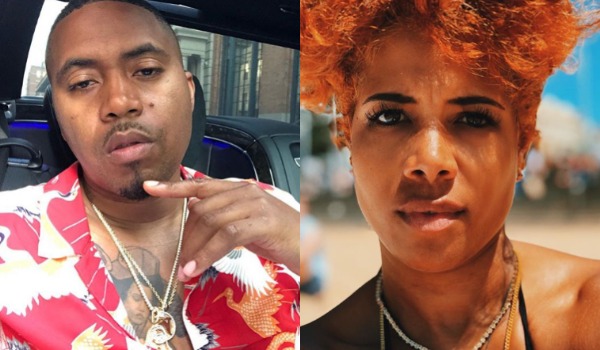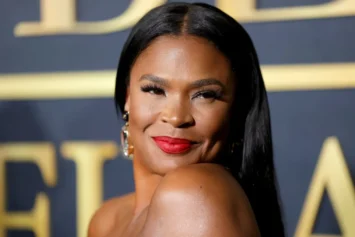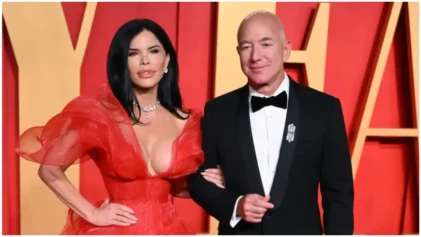The National Association for the Advancement of Colored People, recognizing the profound pain associated with the N-word, took a significant stand in 2007 by calling for a ban on its usage. According to the group’s leaders, the word is “derogatory, degrading, dehumanizing, and is one of the most offensive words in history.”
While the N-word has long been used as a racial slur, rapper Nas fanned the flames of controversy about the word a year later. The Grammy winner intended to title his ninth studio album with the term, explaining to MTV News his desire to make the word less potent, akin to how “cracker” lacks the same sting for white individuals. He aimed to diminish the word’s impact amidst prevalent racism globally.

The “Illmatic” artist also said in a separate interview about his reclamation of the word, saying, “The meaning of the word is supposed to be ignorant.”
In promotional efforts for the album, Nas and his then-wife, Kelis, sought to push boundaries by wearing outfits prominently featuring the controversial word on Feb. 10, 2008, at the 50th Grammys.
Nas wore a black T-shirt with the word on the front, while the “Milkshake” singer went for a little more elevated, rocking the slur in gold studs on a starter jacket. This bold fashion statement ignited discussions about the rapper’s attempt to reclaim and redefine the meaning of the word in a society grappling with racism.
im coming this all black history month pic.twitter.com/V4umU3YNA8
— Meech Arlert (@DemetriusHarmon) February 1, 2024
Hakeem “DJ Anonymous” Harmon did not think that Nas was being provocative with the promotional stunt.
“The word does not become any less ignorant when a prominent figure in hip-hop uses it as a title of an album,” he said, according to the Howard University News Service. “That’s like Justin Timberlake naming his album Willie Lynch. It’s unacceptable.”
The Rev. Jesse Jackson was also troubled by Nas’ apparent embracing of the word.
“Nas has the right to degrade and denigrate in the name of free speech, but there is no honor in it. I wish he would use his talents to lift up and inspire, not degrade,” Jackson said at the time.
Not everyone took offense or overlooked Nas’ wardrobe statement and the message he aimed to convey.
“I think it’s genius personally,” said Pharoh Martin, co-founder and editorial director of Streetz Magazine.
“He’s not approaching this subject from an ignorant point of view. He’s a poet so whatever he says is meant to be proactive in order to get his point across,” he told Howard News Service.
Martin also noted that Nas “isn’t the first person to put out a work with the word in the title, but he’s being crucified. Dick Gregory did it and Randall Kennedy wrote a book with that title and this much backlash didn’t happen.”
DJ Richard Graves, blogger for DJ Black Adam, said he didn’t understand how Nas’ logic made sense, maintaining that the rapper was simply drumming up controversy to sell his project.
“Maybe I went to sleep in my grammar and history classes, but I didn’t know that that word actually had a root in meaning ignorant. I thought that the word came from a Spanish word that meant black, a Spanish-Portuguese word, and was later used to be a negative term used for black slaves. So I don’t understand Nas’ pseudo-logic,” Graves said on NPR’s “Bloggers’ Roundtable” days after the couple’s stunt. “Obviously — to me — the man just wants to make money.”
Graves joined many others, and their voices overpowered the Queensbridge native.
Facing opposition from politicians, community activists, teachers, and even his label, Nas released the album in 2008 as “Untitled” due to the controversy surrounding the intended title.
This was the title of Nas’ album then it was later changed to Untitled. https://t.co/ax3v3M6l9p pic.twitter.com/q911rwWLp3
— JS (@janellejs) October 24, 2023
Despite his push for control, the label, known for promoting hardcore artists globally, refused support, fearing substantial financial loss. New York’s Comptroller, Thomas DiNapoli, threatened to withdraw $84 million from the state pension fund invested in Universal and Vivendi if the album retained the original title using the “N-word.”
Nas is not the only artist navigating the complexities of the word. Black comedians, from Richard Pryor to Chris Rock, and musicians like Solange in her song “F.U.B.U.,” have sought to reclaim the term, trying to turn it into a symbol of endearment.
Jenna Wortham, the host of the “Still Processing” podcast said in 2021, that Beyoncé’s sister isn’t just singing the word, but “She’s talking about cornrows. She’s talking about affectations of speech. You can put these things on all you want. You can layer on all these accouterments of Blackness, but you will never be Black.”
Wortham believes many are focusing too much on the use of the N-word and becoming distracted from the work of dismantling racism. At the same time, some people are being fooled into thinking the word has no impact.
She said, the term is “performing labor, and that labor is divisive. The labor is: As long as there’s someone below me, I’m OK.”
“Even when we can’t directly see it sweating,” Wortham added, “It is working, honey. Like it is working in the same way that it worked since it came into existence.”
Fans are looking forward to the 66th Grammy Awards, which airs Sunday night Feb. 4 at 8 p.m., and what controversial moments may or may not occur.


